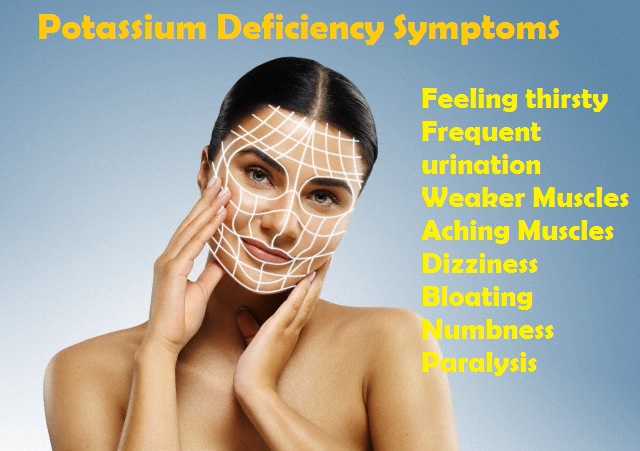Potassium Deficiency Symptoms, Causes and Treatment in humans
Potassium is a mineral, and very important for the human body. The body is able to function well only if it receives the necessary amount of potassium from your diet. It is vital for proper functioning of all organs in the body. It plays a major role in muscle building, converting glucose to glycogen, and helps your body develop. Hypokalemia is a medical condition that is caused due to the deficiency of potassium. You suffer from allergies, formation of stones in your kidney, acne, allergies, and other such problems due to hypokalemia. Read on to get basic information about potassium deficiency, the causes and symptoms, and tips to avoid the deficiency and stay healthy.
Causes of Potassium Deficiency:
If your diet contains a low amount of fruits and vegetables, you are prone to potassium deficiency. Fruits like bananas and apples, sea food, green leafy vegetables, whole grains, and some herbs are all rich in potassium. When the body loses fluids by vomiting, excessive sweating, diarrhea, or any such reasons, even potassium is flushed out of the body. This could cause deficiency of the element. Certain prescription medications or health complications caused by kidney malfunctioning or diabetes can also cause loss of potassium.
Symptoms of Potassium Deficiency:
- Feeling too thirsty, and frequent urination
- Muscles become weaker or more tender
- Muscles become stiff, and start aching
- Heart palpitations
- Occasional fainting or dizziness
- Bloating or cramps in the abdomen
- Tingling sensation or numbness
- Paralysis
Potassium deficiency Diseases and Their Treatment:
Diabetic Complications:
Diabetic patients can have further complications if the level of potassium decreases in the blood. This makes the body less sensitive to insulin, and leads to higher blood sugar levels.
Hair Loss or Alopecia:
If your diet does not contain the necessary amount of potassium, it can affect your hair also. Hair loss or alopecia is caused. Fungus, chemotherapy, iron deficiency and intake of some drugs are other causes of alopecia.
Irregular Heart Functioning:
Potassium helps the muscles function effectively. It is the same for your heart also. As such, if there is a decrease in the potassium levels, it causes irregular heart beat. In extreme cases, it can even be the reason for getting a heart attack or cardiac arrest.
Increased Blood Pressure:
Potassium is needed in the necessary amounts to keep your blood pressure under control. When the pressure of the blood flowing in to your heart becomes elevated, or causes a condition called high blood pressure or hypertension. When the kidney expels potassium and keeps back only sodium, this condition is caused. It causes symptoms like fatigue, shortness of breath, dizziness, and heart palpitations.
Kidney Problems:
Potassium is responsible for maintaining the electrolyte, fluid, and pH levels in the body. This mineral is very important for the body as it helps the kidneys in the blood filtering process. You need between 3.5 to 5.0 mEq/L of potassium. This is the range of healthy potassium levels in the blood. If there are an drastic changes from these levels, it is very harmful for the kidneys.
Migraines:
Repeated occurrence of headaches or migraines is a medical condition that is caused by the deficiency of potassium. People who are prone to migraines are most likely to get this disease if adequate amount of potassium is not available in the body. You can get relief by increasing the amount of potassium intake. Include lots of potassium rich foods in your diet for this purpose.
Mental Fatigue:
If the levels of potassium in your blood are low, it affects your mind too. Your psychological health is also adversely affected. Depression, mood swings, disorientation, irritability, and even bipolar disorder can be caused.
Muscular Degeneration:
Hypokalemia is caused if the potassium level in the bloodstream is dropped by a significant amount. A predominant feature of hypokalemia is weakness in the muscles. It also causes cramps, heart palpitations, and fatigue. Paralysis can also be caused in extreme cases, when the muscular fibers break down.
Stomach Problems:
When the potassium levels in your blood get lowered, you can get an upset stomach. The muscles of the gastrointestinal tract get weakened, and you get affected by nausea, bloating, vomiting, constipation, and other such issues of the stomach
Skin Diseases
Lack of potassium could lead to dryness of the skin, acne, blisters, skin eruptions, and other such skin problems.
How to Treat Potassium Deficiency Effectively?
- Keep on supplying your body with enough fluids. This ensures that any loss caused due to body secretions is replenished from time to time.
- You need to ensure that your diet contains the required amount of potassium. For this, include foods that are rich in potassium. They provide your body with the correct amounts of potassium to control the deficiency and its symptoms.
- Keep a check on your potassium levels. If the level drops to dangerously low levels, you need to take supplements. Supplements ensure that the level is maintained without any further dangerous consequences. However, you must consult your doctor before taking any such medication. Do not try to treat your body on your own. Seek the advice of an expert.
- Make no delay in treating diarrhea or vomiting. Treating right in time makes sure that you do not encounter any further loss of potassium.
As you see, potassium is a very important mineral for the human body. Deficiency of potassium could cause dangerously harmful situations. The only way to combat all such issues is to keep the level of potassium in your blood within the required range. In case of any drop in the level, treat it as soon as possible. Do not wait for the symptoms to appear. Fill your diet with potassium rich foods to avoid any ugly situations. You must provide your body with all the necessary minerals to keep your body healthy and happy.




